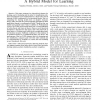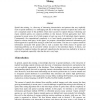75 search results - page 8 / 15 » A Theory of Hierarchical Consequence and Conditionals |
SIAMCO
2008
13 years 7 months ago
2008
This paper builds a new theoretical connection between singular control of finite variation and optimal switching problems. This correspondence provides a novel method for solving ...
TNN
1998
13 years 7 months ago
1998
— This paper proposes two hierarchical schemes for learning, one for clustering and the other for classification problems. Both schemes can be implemented on a fuzzy lattice neu...
SYNTHESE
2010
13 years 5 months ago
2010
: Some intuitive normative principles raise vexing „detaching problems‟ by their failure to license modus ponens. I examine three such principles (a self-reliance principle and...
VLDB
1997
ACM
13 years 11 months ago
1997
ACM
Spatial data mining, i.e., discovery of interesting characteristics and patterns that may implicitly exist in spatial databases, is a challenging task due to the huge amounts of s...
NIPS
2008
13 years 9 months ago
2008
Hierarchical probabilistic modeling of discrete data has emerged as a powerful tool for text analysis. Posterior inference in such models is intractable, and practitioners rely on...


